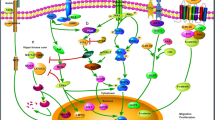0
/G1 channel number of tumor cells to the G0/G1 channel number of stromal cells. There was no significant difference in survival between patients with diploid tumors and those with aneuploid tumors (P = 0.322), although the survival rate was significantly lower in patients with a high DI (≥1.5) than in those with a low DI (<1.5) (P = 0.004). A multivariate analysis of prognostic factors using Cox's proportional hazard model showed that Dukes' staging was the strongest predictor of survival, followed by the DI of tumor cells, then histological differentiation. In conclusion, it is suggested that the DI of tumor cells is instructive for predicting the survival of patients with colorectal cancer.
Similar content being viewed by others
Author information
Authors and Affiliations
Additional information
(Received for publication on Mar. 24, 1997; accepted on Nov. 6, 1997)
Rights and permissions
About this article
Cite this article
Yamamoto, T., Matsumoto, K. & Iriyama, K. Prognostic Significance of the DNA Index in a Colorectal Cancer. Surg Today 28, 792–796 (1998). https://doi.org/10.1007/s005950050228
Issue Date:
DOI: https://doi.org/10.1007/s005950050228




